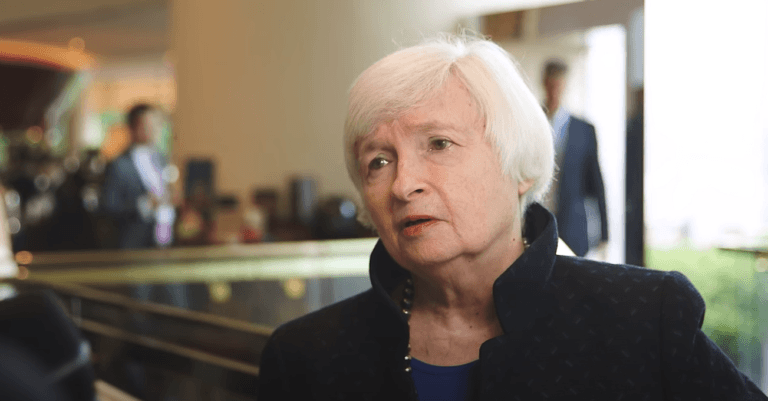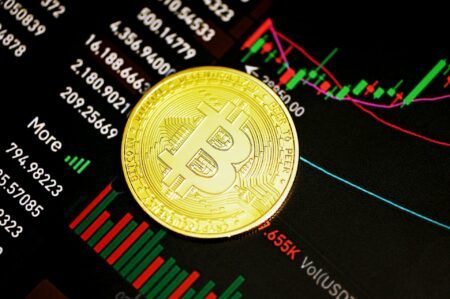Earlier today (March 25), U.S. Treasury Secretary Dr. Janet Yellen shared her thoughts on crypto during an interview with CNBC.
Yellen’s comments about crypto were made while she was being interviewed by CNBC “Squawk Box” co-anchor Andrew Ross Sorkin.
After Sorkin told Yellen that Russia’s energy chief had expressed on Thursday (March 24) the idea that it might start accepting Bitcoin as payment for oil and gas, he asked her what it said about where “we are in the crypto conversation.”
Yellen replied:
“Well, crypto’s obviously grown by leaps and bounds, and it’s now playing a significant role, not really so much in transactions, but in investment decisions of lots of Americans. And the President just issued, a couple of weeks ago, an executive order tasking us and other agencies with thinking about the regulation of crypto.“
Sorked then asked Yellen if this meant that she was less skeptical about crypto these days than she has been in the past.
Yellen answered:
“I have a little bit of skepticism [because] there are I think valid concerns around it. Some have to do with financial stability, consumer investor protection, use for illicit transactions, and other things. On the other hand, there have been benefits from crypto, and we recognize that innovation in the payment system can be a healthy thing. We would like to come out eventually with recommendations that will create a regulatory environment in which healthy innovation can occur.“
Yellen “served as the Chair of the Federal Reserve from 2014 to 2018, and as Vice Chair from 2010 to 2014.”
Sorkin was correct in thinking that Yellen sounded a lot more skeptical about crypto in the past.
According to a report by Coindesk published on 24 November 2020, here are some comments made by Yellen about cryptocurrency and blockchain technology while she was working as the Fed chair:
- February 2014: “The Fed doesn’t have authority to supervise or regulate bitcoin in any way.”
- October 2015: “We do not interpret bitcoin’s popularity as having a relationship with the public’s view of the Federal Reserve’s conduct of monetary policy.”
- September 2016: “[Blockchain] could have very significant implications for the payments system and the conduct of business.”
- January 2017: “[Blockchain] is a very important, new technology that could have implications for the way in which transactions are handled throughout the financial system.”
- December 2017:
- “It [i.e. Bitcoin] is not a stable store of value and it doesn’t constitute legal tender. It is a highly speculative asset.”
- “The Fed doesn’t really play any role, any regulatory role with respect to bitcoin other than assuring that banking organizations that we do supervise are attentive that they’re appropriately managing any interactions they have with participants in that market, and appropriately monitoring anti-money laundering [and] Bank Secrecy Act responsibilities that they have.”
- October 2018: “I will just say outright I am not a fan [of Bitcoin], and let me tell you why. I know there are hundreds of cryptocurrencies and maybe something is coming down the line that is more appealing but I think first of all, very few transactions [that] are actually handled by bitcoin, and many of those do take place on bitcoin are illegal, illicit transactions.”
On 19 January 2021, the U.S. Senate Committee on Finance held a hearing to consider the anticipated nomination of former Fed Chair Janet L. Yellen to Secretary of the Treasury.
On page 93 of the written responses for the record, which were released on 21 January 2021, there was the following question:
“Dr. Yellen, what do you view as the potential threats and benefits these innovations and technologies will have on U.S. national security? Do you think more needs to be done to ensure we have appropriate safeguards and regulations for digital and cryptocurrencies in place?“
And here was Yellen’s answer:
“I think it important we consider the benefits of cryptocurrencies and other digital assets, and the potential they have to improve the efficiency of the financial system. At the same time, we know they can be used to finance terrorism, facilitate money laundering, and support malign activities that threaten U.S. national security interests and the integrity of the U.S. and international financial systems.
“I think we need to look closely at how to encourage their use for legitimate activities while curtailing their use for malign and illegal activities. If confirmed, I intend to work closely with the Federal Reserve Board and the other federal banking and securities regulators on how to implement an effective regulatory framework for these and other fintech innovations.“
Disclaimer
The views and opinions expressed by the author, or any people mentioned in this article, are for informational purposes only, and they do not constitute financial, investment, or other advice. Investing in or trading cryptoassets comes with a risk of financial loss.








